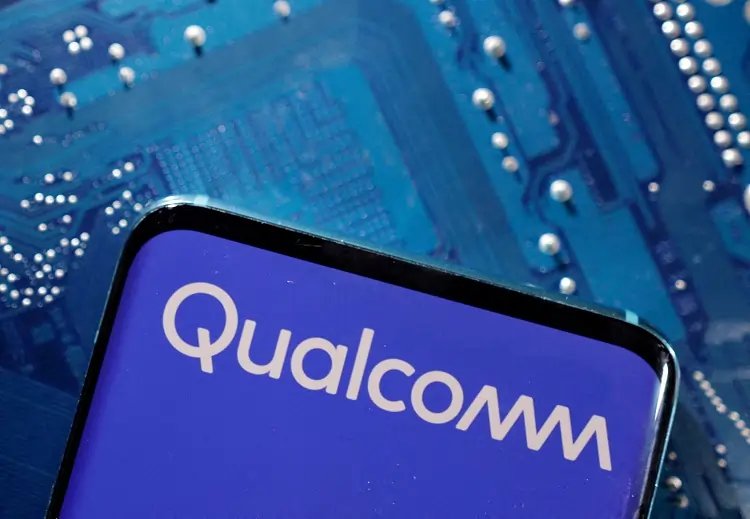Qualcomm chip sales to Chinese smartphone makers fuel strong results


By Stephen Nellis and Arsheeya Bajwa
(Reuters) – Chip designer Qualcomm on Wednesday forecast sales and profit in the current quarter would exceed Wall Street estimates as the company benefits from a wave of launches of flagship Chinese smartphones.
The company’s shares rose 5.5% in extended trading. They had surged 12% right after it reported results after the company also flagged a new $15 billion stock buyback.
The San Diego, California-based company is the biggest supplier of smartphone chips and is benefiting from a recovery in smartphone markets as consumers upgrade devices for artificial intelligence applications such as chatbots and image generators.
Qualcomm’s derived 46% of its revenue in its most recent fiscal year from customers with headquarters in China.
The company shot down a question on a post-earnings call on whether the surge in China sales were prompted by concerns over possible tariffs that could be put in place by Donald Trump, who was re-elected as U.S. president on Tuesday.
Qualcomm executives said they did not believe the prospect of tariffs on Chinese goods played a role in rising sales.
Trump has floated second-term plans for blanket tariffs of 10% to 20% on virtually all imports as well as tariffs of
60% or more on goods from China, in a bid to boost U.S. manufacturing.
“Trump’s policies do pose a risk to the broader semiconductor industry, but it remains to be seen if he allows a China takeover of Taiwan and if aggressive tariffs are implemented,” said Angelo Zino, vice president and senior equity analyst at CFRA Research.
Qualcomm said it expects sales and adjusted profits for its fiscal first quarter – which will cover the holiday shopping season in U.S. and European markets – with a midpoint of $10.90 billion and $2.95 per share. Wall Street expected $10.59 billion and $2.86 per share, according to data from LSEG.
For the fiscal fourth quarter ended Sept. 29, Qualcomm said sales and adjusted profits were $10.24 billion and $2.69 per share, beating analyst expectations of $9.91 billion and $2.56 per share.
While Qualcomm’s current outlook topped Wall Street expectations, investors are still trying to gauge how quickly its revenue stream from Apple will fade. Apple is working on its own modem chips, and Qualcomm has warned investors that the iPhone maker will stop using its chips at some point.
While Qualcomm has a deal to keep selling chips to Apple until at least 2026, Wall Street is watching to see whether Qualcomm’s efforts to break into laptops and artificial intelligence in data centers will ramp up quickly enough to offset declines in Apple revenue.
But launches of new flagship phones from Chinese Android brands such as Xiaomi, Oppo and Vivo helped lift Qualcomm’s forecast, said Kevin Cassidy, managing director at Rosenblatt Securities.
Qualcomm on Wednesday also said it had signed a new licensing agreement with Shenzhen Transsion Holdings Co Ltd, a Chinese firm that makes phones for developing markets.
Qualcomm is in a protracted legal dispute with Arm, whose technology Qualcomm uses in almost all its flagship products. Arm last month threatened to cancel a key license with Qualcomm, and the trial in a case brought by Arm in a license dispute is set to start in December.
In Qualcomm’s chip segment, the company forecast fiscal first-quarter sales with a midpoint of $9.3 billion, compared with analyst estimates of $9.02 billion, according to Visible Alpha data. Qualcomm predicted first-quarter sales with a midpoint of $1.55 billion in its patent-licensing business, compared with estimates of $1.51 billion.
(Reporting by Stephen Nellis in San Francisco and Arsheeya Bajwa in Bengaluru; Editing by David Gregorio and Diane Craft)
A stock buyback occurs when a company purchases its own shares from the marketplace, reducing the number of outstanding shares and often increasing the value of remaining shares.
Revenue is the total income generated by a company from its business activities, typically from sales of goods or services before any expenses are deducted.
Flagship smartphones are the top-tier models produced by a manufacturer, showcasing the latest technology, features, and design, often marketed as premium devices.
Explore more articles in the Technology category











